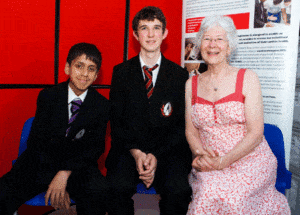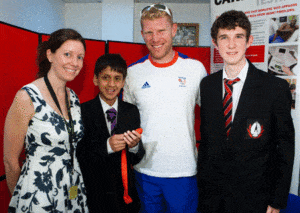On Tuesday 29th June 2010, 70 students from Year 10 in Ernest Bevin College were offered free cardiac screening by the heart charity Cardiac Risk in the Young (CRY). As part of this event and to raise awareness and vital funds for CRY, hundreds of Bevin boys raised money for the charity with a series of ‘swimathons’.
CRY was founded in May 1995 to raise awareness of Sudden Arrhythmia Death Syndrome (SADS). As well as campaigning and lobbying and the provision of its subsidised cardiac screening programme for young people, the charity also provides counselling and support to bereaved families and individuals who may be diagnosed.
During the day, two intrepid young journalists (Adam Piekarski and Schlujaat Waraich) had the exciting opportunity to interview three key ambassadors for the charity: Professor Sanjay Sharma from St George’s Hospital, Tooting; CRY’s Chief Executive and Founder, Alison Cox MBE, and Olympic rowing medallist, Matt Wells.
Adam Piekarski (10EJ) and Schlujaat Waraich (7NW) write:
Video production by Dead Ready Productions
Sudden cardiac death in the young claims the lives of at least 12 apparently fit and healthy people, aged 35 and under, in the UK every week. 80% of young people have no signs or symptoms and so the only way to detect a potentially sinister cardiac abnormality is by having this simple screening test.
For the first time ever, CRY chose to come to Ernest Bevin College to offer free screening to fourteen and fifteen year olds (born in 1995 – the year that CRY was founded). This is because the new CRY Centre for Inherited Cardiovascular Conditions and Sports Cardiology is now based at nearby St Georges Hospital, Tooting.
We started the afternoon by talking to Professor Sanjay Sharma, 46, who started supporting Cardiac Risk in the Young (CRY) in 1996 and is currently working at St Georges Hospital. He states that: “12 people die every week” in the UK and the majority of these people are only 18 to 19 years old. He added that these people are “losing 60 years of life”, but this life can be saved by simple tests.
Professor Sharma advises that those who could potentially die from Sudden Cardiac Death (SCD) should not participate in intensive sport and should seek less intensive sports such as golf or bowls. He also says that in extreme cases pills, called “beta blockers”, can slow the heart down therefore reducing stress on it. Also, surgery and pacemakers can cure Sudden Arrhythmic Death Syndrome (SADS).
SADS often carries no symptoms at all. Approximately 20% of sufferers have symptoms, which include fainting, blackouts and palpitations. Professor Sharma said that it is important to screen fourteen and fifteen-year-olds because once someone is older it may be “difficult to stop” them participating in their sport of choice and that it is easier to train them to take different paths in life when they are younger. He adds that it’s important to “raise awareness” of SADS by going to schools and informing parents. Sanjay Sharma started working for CRY in 1996 and was inspired by the founder, Alison Cox.

CRY’s Chief Executive and Founder, Alison Cox MBE, founded CRY in 1995. Cox set up the charity after her son was diagnosed with SADS and was forced to undergo surgery. She told us that her son went through “a battery of tests” and that “his heart was a funny shape”.
Fortunately, he survived. However, this experience encouraged her to start a charity to help the whole country gain awareness of these relatively unknown diseases.
Before CRY was founded, there was no specific charity or organisation that specialised in SCD and SADS. The CRY charity provides the vital counselling and support for bereaved families and individuals who get this often terrifying diagnosis.
As part of raising awareness and vital funds, Cox worked with Andy Burnham, then Secretary of Sport and Media (currently running for Labour leader), to launch CRYswim 2010.
These events were a series of ‘swimathons’ and swimming initiatives. Ernest Bevin College supported CRY by hosting a week of sponsored swimming. Cox believes that she has a “real link with Ernest Bevin College now”. She said, “You are a very sporty school, but also very academic”. She continued by describing the school as an “inspiration for Andy” when he takes part in the gruelling Great North Swim, across Lake Windermere in the summer.
Olympic rower, Matthew Wells, is also a great supporter for the charity. Matthew Wells became a patron of CRY after his wife’s brother’s friend was sailing and then suddenly passed away.
We asked Wells about his sporting career as Ernest Bevin College is a specialist sports college and many students have aspirations to become Olympic athletes. He told us that he was first selected for the double sculls in the British Rowing Team at the 1997 World Championships. The double went on to win a junior gold medal. Wells has also won Bronze in a single scull at the Under-23 World Championships in 1999 and more recently won a Bronze medal in the men’s double scull at the 2008 Beijing Olympics.

Matthew Wells, who now lives in Putney, said that he does 5 hours of rowing a day and covers 24 kilometres during a training session. He stated, “Me and my friends do weights every day for 3-4 hours”.
His diet contains 5000 calories a day (approximately double the average!). Wells’ role model is Steve Redgrave, who won gold medals at five consecutive Olympic Games from 1984 to 2000. He said, “I have met him many times and when I was training for the Sydney Olympics he was at the training camp everyday and I ate breakfast, lunch and dinner with him”.
Overall, we believe that CRY has had a positive influence on Ernest Bevin College and we appreciate the free screening, support and knowledge that CRY provided to the college and we will not forget this amazing event.
For more information about organising a CRY sponsored swim in your school or local community please visit
www.c-r-y.org.uk/cryswim2010.htm
To register a sponsored swimming event online, please visit www.cryswim4andy.org





